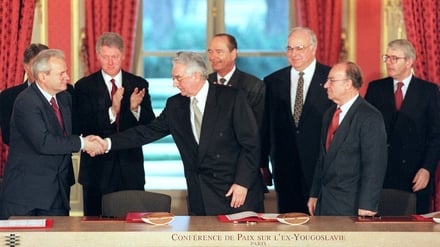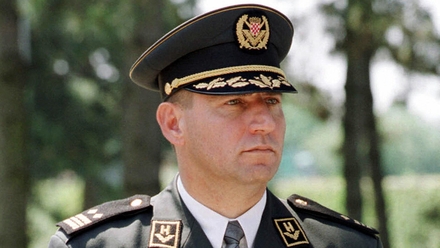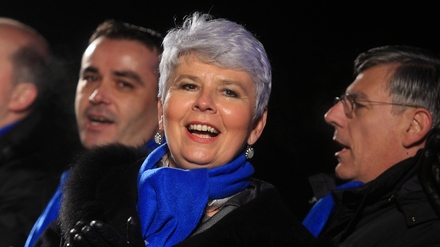Croatia has signed its European Union accession treaty in Brussels and is set to become the union's 28th member on 1 July 2013.
It will be only the second former Yugoslav republic, after Slovenia, to join the union. Following is a brief timeline of its relations with the EU:
1991 - Croatia declares independence from Yugoslavia but its Serb minority, backed by the Yugoslav army, rebels and captures one third of the country. UN peacekeepers and EU observers monitor tense ceasefire for nearly four years.
1995 - Croatian troops recapture two rebel enclaves to control all country's territory. Peace treaty signed in November, ending wars in Croatia and Bosnia (below).
1996 - Croatia joins the human rights watchdog, the Council of Europe, despite criticism over its poor rights record, suspect media freedoms and economic mismanagement.
1999 - Franjo Tudjman, the first president and "father of the nation" dies of cancer, paving the way for elections that oust his nationalist HDZ party from power.

2000 - A reformist coalition wins power and seeks to put Croatia in the European mainstream. An EU-Balkan summit in Zagreb affirms that all Balkan nations, crippled by ethnic wars and stagnating economies, have a future in the EU.
2001 - Zagreb and Brussels sign accord on associate membership, which calls for resolving war crimes issues, returning refugees and cooperating with former foes in the region. But Croatia fails to arrest General Ante Gotovina, who goes into hiding to avoid a UN war crimes tribunal indictment.
2002 - Croatia refuses to hand over former army chief General Janko Bobetko to The Hague tribunal, straining ties with the EU despite good progress in economic and legal reforms. Gen Bobetko was later declared medically unfit to stand trial and died the next year.
2003 - Britain and the Netherlands refuse to ratify associate EU membership accord because of Croatia's insufficient cooperation with the tribunal. Croatia formally applies for EU membership.
2004 - Zagreb hands over two wartime generals and six Bosnian Croats to the tribunal in a sign of improved cooperation.
The European Commission gives Croatia the status of candidate country and sets date for accession talks in March 2005, but stresses Zagreb still needs to hand over Gen Gotovina (below).

March 2005 - EU foreign ministers postpone the start of membership talks as the bloc remains divided in assessment of Zagreb's war crimes cooperation.
April - Support for EU membership within Croatia drops below 50%.
3 October - The tribunal's chief prosecutor Carla Del Ponte tells the EU that Croatia is now cooperating fully with the tribunal in the search for Gen Gotovina, clearing the last hurdle for the EU to open talks with Zagreb.
Croatia opens talks, together with Turkey, hoping to conclude them in time to join in 2008 or 2009.
2005-08 - Talks progress slowly. By the end of 2008, Croatia closes only seven of the 33 negotiating chapters that comprise the entire EU legislation.
2008 - Croatia declares a protected fishing and maritime zone in the Adriatic, straining relations with neighbours. It soon backtracks, saying the zone will not apply to EU members.
December - EU neighbour Slovenia blocks Croatia's progress because of a border row dating back to the former Yugoslavia. The obstruction, affecting about one third of negotiating chapters, remains in force until October 2009.
July 2009 - Prime Minister Ivo Sanader suddenly quits, citing frustration with slow EU progress.
September - His successor, Jadranka Kosor (below), reaches agreement with Slovenian Prime Minister Borut Pahor and Slovenia lifts the blockade the following month.

2010 - Croatia steps up fight against political and business corruption.
It indicts several general managers in top state companies, a former cabinet minister and a deputy prime minister, and zeroes in on former premier Mr Sanader who is arrested in Austria. The pace of the entry talks significantly intensifies.
June 2011 - The European Commission says Croatia has met all criteria for completion of EU entry talks, including the toughest chapters on judiciary and competition policy.
Member states agree at an EU summit on 24 June to conclude the talks and to admit Croatia as a member on 1 July 2013.
4 December - Elections lead to a new centre-left government that sets a February date for a required referendum on EU membership.
Polls show some 57% of citizens support EU entry, while about a third oppose it.
9 December - Croatia signs the accession treaty that has to be ratified by the Croatian parliament and by all 27 EU member states before the scheduled entry date.
1 July 2013 - Scheduled date for EU accession.

